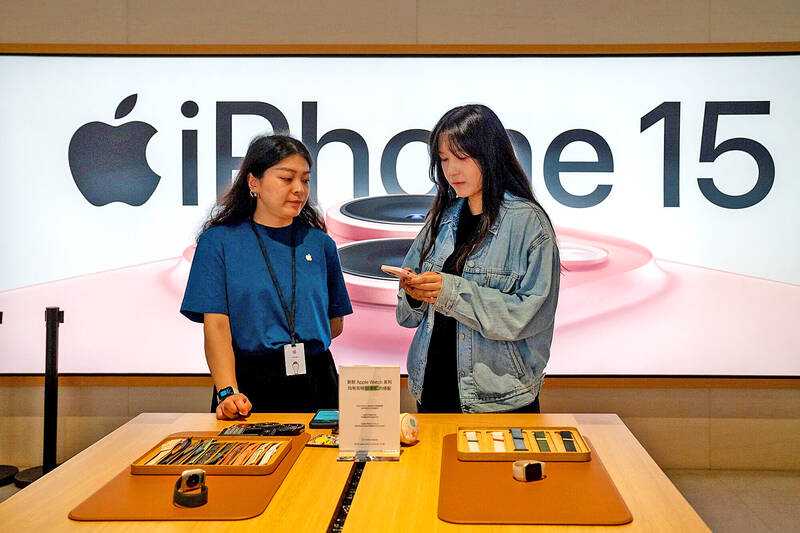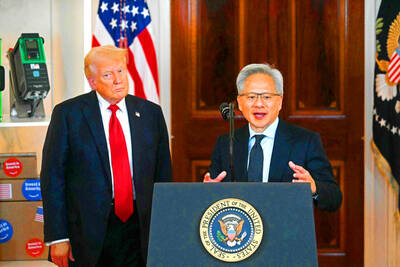Apple Inc’s iPhone sales slump in China is deepening and the company is likely to see volumes decline further this year, Jefferies analysts led by Edison Lee (李裕生) said.
The iPhone maker’s latest generation got off to an atypically sluggish start in China last year, which most recently expanded to a 30 percent year-on-year decline, Lee and colleagues said in a note on Sunday, citing industry checks.
The rest of the country’s mobile market grew last month, with Huawei Technologies Co (華為) growing the fastest on the back of its new Mate 60 device lineup.

Photo: Bloomberg
Weeks before the iPhone 15 went on sale in September last year, Huawei’s debut of the Mate 60 Pro — which runs on a new made-in-China system processor — spurred a patriotic fervor that reclaimed some of the customers it previously lost to Apple.
Jefferies estimates that Huawei shipped 35 million smartphones last year, with some supply constraints preventing that number from being larger.
Apple saw a double-digit percentage fall in volume last month and Jefferies forecasts a similar decline for this year.
Discounts on Apple’s smartphone range increased last week across various online shopping portals, cutting into the average selling price without stimulating growth in volume.
Apple gained share in China after US sanctions cut Huawei off from the world’s leading chipmakers, such as Taiwan Semiconductor Manufacturing Co (台積電), in 2020.
The Shenzhen-based electronics firm’s return to competitiveness in the mobile market has seen it claw back market share, and it is now developing its own software ecosystem to compete with Apple’s iOS and Alphabet Inc’s Android.
Separately, Hon Hai Precision Industry Co (鴻海精密), the world’s largest assembler of iPhones which is known internationally as Foxconn Technology Group (富士康科技集團), is losing a long-time executive in India, just as the manufacturer is pushing to expand in the South Asian country.
Josh Foulger, the country head of Foxconn’s Bharat FIH arm, is leaving the company after nine years, people familiar with the matter said.
Foulger, a three-decade veteran in the electronics industry, has helped the Taiwanese contract manufacturer and its customers including Xiaomi Corp (小米) expand in India.
Over time though, Bharat FIH began losing share of the Xiaomi business as the Chinese brand sought more local partners in India after the country’s government encouraged manufacturers to work more closely with Indian suppliers.

Taiwan Semiconductor Manufacturing Co (TSMC, 台積電) last week recorded an increase in the number of shareholders to the highest in almost eight months, despite its share price falling 3.38 percent from the previous week, Taiwan Stock Exchange data released on Saturday showed. As of Friday, TSMC had 1.88 million shareholders, the most since the week of April 25 and an increase of 31,870 from the previous week, the data showed. The number of shareholders jumped despite a drop of NT$50 (US$1.59), or 3.38 percent, in TSMC’s share price from a week earlier to NT$1,430, as investors took profits from their earlier gains

AI TALENT: No financial details were released about the deal, in which top Groq executives, including its CEO, would join Nvidia to help advance the technology Nvidia Corp has agreed to a licensing deal with artificial intelligence (AI) start-up Groq, furthering its investments in companies connected to the AI boom and gaining the right to add a new type of technology to its products. The world’s largest publicly traded company has paid for the right to use Groq’s technology and is to integrate its chip design into future products. Some of the start-up’s executives are leaving to join Nvidia to help with that effort, the companies said. Groq would continue as an independent company with a new chief executive, it said on Wednesday in a post on its Web

CHINA RIVAL: The chips are positioned to compete with Nvidia’s Hopper and Blackwell products and would enable clusters connecting more than 100,000 chips Moore Threads Technology Co (摩爾線程) introduced a new generation of chips aimed at reducing artificial intelligence (AI) developers’ dependence on Nvidia Corp’s hardware, just weeks after pulling off one of the most successful Chinese initial public offerings (IPOs) in years. “These products will significantly enhance world-class computing speed and capabilities that all developers aspire to,” Moore Threads CEO Zhang Jianzhong (張建中), a former Nvidia executive, said on Saturday at a company event in Beijing. “We hope they can meet the needs of more developers in China so that you no longer need to wait for advanced foreign products.” Chinese chipmakers are in

POLICY REVERSAL: The decision to allow sales of Nvidia’s H200 chips to China came after years of tightening controls and has drawn objections among some Republicans US House Republicans are calling for arms-sale-style congressional oversight of artificial intelligence (AI) chip exports as US President Donald Trump’s administration moves to approve licenses for Nvidia Corp to ship its H200 processor to China. US Representative Brian Mast, the Republican chairman of the US House Committee on Foreign Affairs, which oversees export controls, on Friday introduced a bill dubbed the AI Overwatch Act that would require the US Congress to be notified of AI chips sales to adversaries. Any processors equal to or higher in capabilities than Nvidia’s H20 would be subject to oversight, the draft bill says. Lawmakers would have